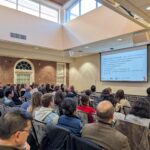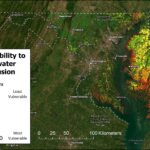University scientists and local stakeholders connect with a common goal to create more climate-resilient communities in Maryland.
College Park, MD – The Climate Resilience Network hosted its second annual Scientists Serving Communities workshop on January 8 and 9, 2025.
More than 100 leaders and decision-makers from federal, state, county, and local government, working in areas like emergency management, public works, zoning, education, and climate resilience were invited to the University of Maryland campus to meet with university scientists and experts to discuss climate issues affecting their communities.
“The Climate Resilience Network underscores the critical importance of collaboration between academic research and practical application to help the citizens of Maryland,” said Ralph Ferraro ESSIC Associate Director and Principal Investigator of Climate Resilience Network, “This workshop is a unique opportunity to exchange insights, tackle real-world challenges, and collaboratively develop evidence-based solutions that enhance community resilience by fully understanding the needs of the end users.”
Photos from the Scientists Serving Communities conference. Photos taken by Cazzy Medley.
This workshop differed from most in that panels were discussion-based rather than presentation-based, with subject matter experts serving as panelists answering questions offered by stakeholders. This helped root the discussion in real-world experiences, and offered stakeholders the opportunity to see how their work can contribute to better local decision-making.
“Workshops like these help lessen the academic-practitioner divide, which accomplishes two things,” said Kara Buckmaster, Emergency Management Specialist for the Calvert County Government, “First, it helps practitioners make evidence-based decisions in their work, and second, it helps researchers understand what information is still needed so they can continue to focus their research.”
The workshop was considered a resounding success, facilitating new connections and collaboration opportunities. Scientists appreciated honing in on what stakeholders really need.
“It’s easy for scientists to say that they want to help communities but to do this, we have to listen and really understand the problems people are facing before we try to come up with solutions,” said Tim Canty, Director of Marine Estuarine and Environmental Sciences and co-investigator on the Climate Resilience Network, “Workshops like Science Serving Communities provide a valuable opportunity to engage with stakeholders and gain firsthand insight into their needs.”
The Climate Resilience Network anticipates hosting the 2026 Scientists Serving Communities workshop early next year. They hope to host even more community members to continue these collaborations, illustrate progress made in the past year to deliver information to the stakeholders, discuss environmental concerns with experts, and work towards building a more climate-resilient Maryland.
About Climate Resilience Network
The Climate Resilience Network, funded by a University of Maryland Grand Challenges institutional grant, unifies the expertise of UMD’s scientists with the immediate requirements of Maryland’s decision-makers to address new and complicated environmental issues. Working alongside stakeholders, researchers can assess regional needs and find innovative solutions rooted in both the real demands of the community as well as UMD’s groundbreaking research. Based in a research-to-impact philosophy, the initiative develops outcomes that meaningfully support our region, state, nation, and world in addressing societal challenges related to the environment.





